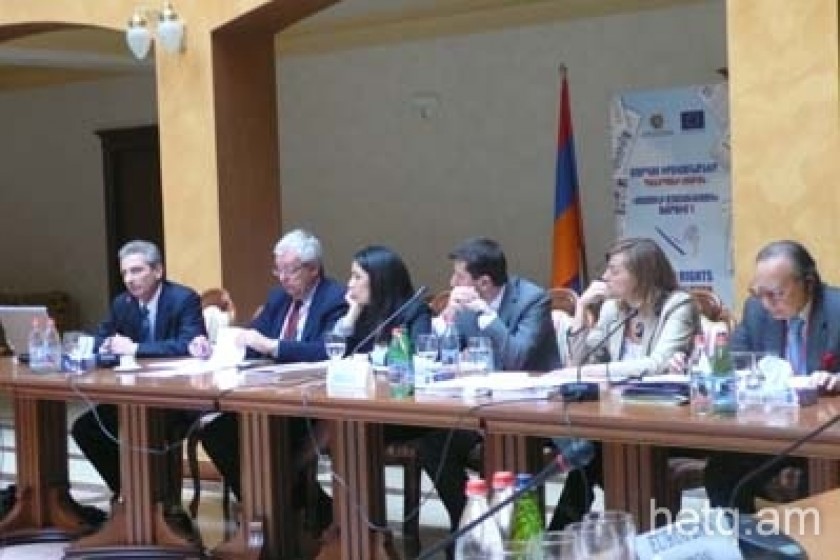
Press in Armenia Threatened Despite Slander Decriminalization
Every year on May 3, International Press Freedom Day, legal rights and media organizations gather to issues their press freedom ratings for countries around the world.
In the Freedom House report issued on May 2, Armenia was rated “partially free” in terms of freedom of expression. This has been Armenia’s rating for the past decade.
Reporters without Borders has recently stated that the monumental financial amounts being demanded in compensation from papers in Armenia threaten their very existence.
This time around the evaluations were even more severe and are a result of the decriminalization of slander and personal abuse charges recently enacted in Armenia. It turns out, however, that this step hasn’t freed reporters and their papers from accountability.
European specialist have advised media outlets in Armenia to follow ethical norms, i.e., self-regulation, while the courts should give primacy to the public interest’s right to know; as is the case in most of Europe.
A European Council press specialist recently gave a talk in Tzaghkadzor at a media freedom conference and stressed the need for a clear-cut legal field that spells out the parameters for freedom of expression in the country. The expert stated that this was needed in addition to an adherence to professional norms and ethics within the field.
“The fact that slander and personal abuse charges have been decriminalized should not be a pretext for courts to hand down such large penalties that will bankrupt certain newspapers. In cases where compensation has been substantiated there must be a balancing act between the plaintiff and defendant. Minimum compensation awards need to be enacted that will satisfy both personal dignity and a reporter’s freedom to work,” said the specialist.
PACE has adopted Resolution 1577 which urges member states to strike a balancing act between the society’s right to information and compensation for defendants. The resolution says that large, unsubstantiated compensation amounts are possibly in contravention to Article 10 of the European Convention of Human Rights.
Attorney Karen Mezhlumyan, who specializes in legal suits brought against the press in Armenia, believes that Civil Code revisions adopted by the RA National Assembly in May, 2010 not only threaten freedom of speech and the press but leave individuals unprotected from non-public slander and defamation.
For instance, certain qualitative traits have been removed from Article 1087.1 of the RA Civil Code’s understanding of concepts dealing with personal injury and slander. These include traits like “decadent” in the case of abuse and “evidently false” in the case of slander.
Mr. Mezhlumyan argues that as a result a situation has been created where any evaluative opinion or evidentiary mistake can be labeled as slander or personal abuse. The attorney says this is a result of legal imprecision and that it is in violation of Article One of the RA Constitution.
The attorney noted that according to Article 135 of the Civil Code a fine of 1 million AMD was envisaged for slander and 800,000 AMD for personal insult according to Article 136. These amounts were classified as exorbitant when the legislation went up for debate.
However, according to Article 1087.1 of the RA Civil Code slander and personal insult accountability amounts were set at 1 million and 2 million respectively. These are much larger fines than levied under the law when criminal charges were still on the books.
If you found a typo you can notify us by selecting the text area and pressing CTRL+Enter
 Videos
Videos Photos
Photos




Write a comment